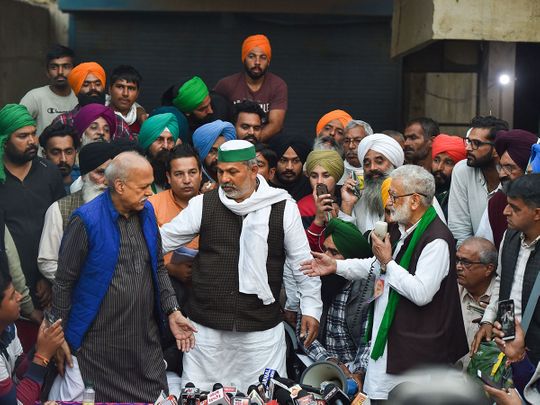
Top Indian farmer leader Rakesh Tikait, 51, recently wept and accused the BJP government of trying to destroy farmers. He said he would die but drink water only from his village. The tearful appeal (which went viral on video) turned the tide for Tikait — a police constable-turned-farm leader.
Tikait, the chief of the Bharatiya Kisan Union (BKS), has had a career that has mostly lacked laurels but, this agitation (ongoing protests against the three farm acts which were passed by the Parliament of India in September 2020) has seen him emerge from the shadow of his father Mahender Tikait who had among other things secured free power for farmers by holding Delhi to a siege in the 1980s.
Holding it out
Tikait, who has contested two elections and lost both, was initially seen as someone close to the BJP. It was assumed that he was someone the ruling party could use to try and strike a deal with the farmers. But, Tikait was quick to realise the actual consequences of the three farm laws on agriculture in India. And he has held firm.
Recently the Uttar Pradesh police set up a menacing formation and asked the agitators to vacate the Ghazipur border but supporters didn’t relent. Hundreds of thousands poured in to the main protesting site with water and sweets for Tikait and others. For once, the police was forced to blink.
Tikait’s coming of age and the support he is getting from Jat leaders across India should worry Yogi Adityanath, the chief minister of UP. The BJP considers western UP its bastion and any schisms in its Jat support base is likely to have serious electoral consequences.
The BJP tried to sully the farmer agitation by calling it names because Sikhs were the most visible part of the agitation. Now Ghazipur and Muzaffarnagar — which saw a maha-panchayat throw its collective weight behind Tikait — is the epicentre of the agitation.
Jats are a hugely dominant caste in western UP, Haryana, Rajasthan and Punjab and for long have been chafing at their disempowerment at the hands of BJP.
The deadly Muzaffarnagar riots (between Jats and Muslims) in 2013 saw the BJP benefit enormously in UP, winning 70 Lok Sabha seats out of 80. But, the Jats now feel that they got nothing from the “Sarkar” (government). Yogi Adityanath has two Jat leaders in his cabinet — both in charge of lacklustre portfolios including animal husbandry.
In Haryana which has had a tradition of Jat chief ministers, BJP chose Manohar Lal Khattar — a Punjabi non-Jat. The union cabinet of India does not have a cabinet ranking Jat minister but, Sanjeev Balyan, a UP Jat, is the minister of state for animal husbandry in the centre.
Outpouring of support
BJP government clearly did not anticipate the outpouring of support for Tikait with farmers from across India now coming in huge numbers to Ground Zero. Government followed its standard play book of getting its pliant channels to attack the farmers, post the violence on January 26.
The resurgence of the moment which had seem to collapse has taken the political minders of the BJP by surprise. Now the normal tactics are being followed of cutting off the internet and some self claimed “locals” attacking the protesting farmers while the police looks the other way.
All this is not likely to work as the farmers — unlike the students of Jawaharlal Nehru University and the anti CAA protesters of Shaheen Bagh enjoy the biggest political capital in India. This is evident in the rush to support Tikait by India’s principal opposition Congress party. Almost the entire opposition is now standing with the farmers.
One Jat leader from Haryana told me bluntly “they had made the Jats fight with the Muslims but, we have now realised that some BJP leaders believe in divide and rule. Now all the Jats are together. They call Sikhs “Khalistani”, what will they dare call us?
The resurrection of the agitation shows yet again that politics can always take you by surprise with unintentional consequences. Even if you are the powers that be.








